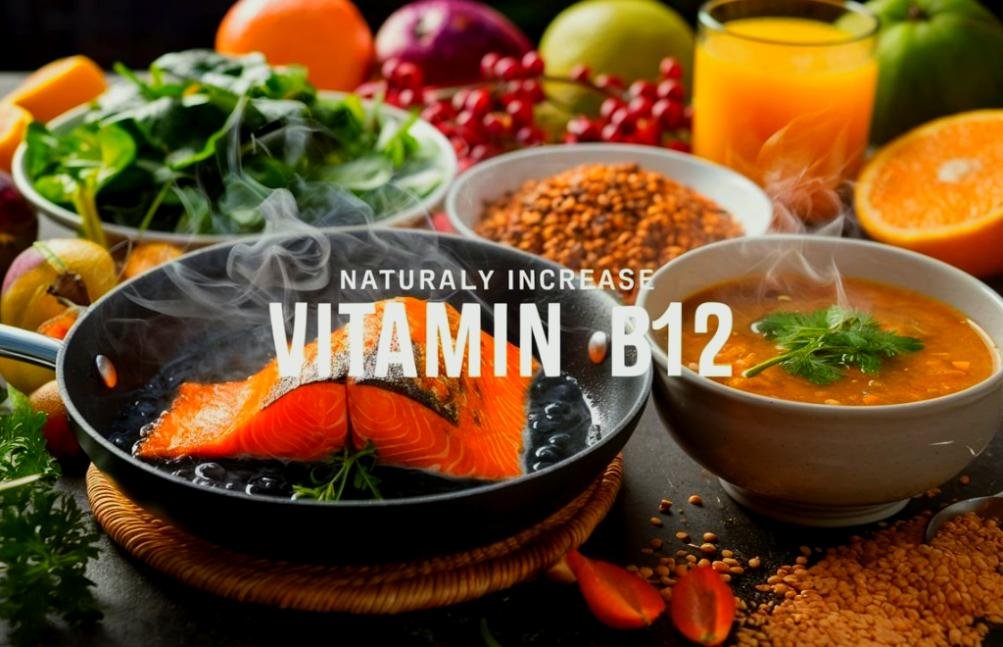Are you just plain out of sort, foggy-headed, or exhausted? Vitamin B12 is the offender (Natural Vitamin B12 Increase), maybe hiding in your diet. Though many of us unintentionally shortchange ourselves, this modest vitamin is absolutely essential for daily operations in your body. Not scared, though! We are about to start a gastronomic journey that will have your B12 levels skyrocketing without using injections or medications.
The B12 Basics: More Than Just Another Vitamin

Let’s straighten our facts before we enter the delicious universe of B12-rich foods. Essential for DNA synthesis, red blood cell creation, and appropriate brain function, vitamin B12—also called cobalamin—is a water-soluble vitamin. Maintaining your fire on all cylinders, this is the unsung hero of your body’s energy output.
The worst part is your body cannot create B12 on its own. It’s like a high-performance car running empty-all potential, no drive. Your diet is then the premium gasoline station for your cellular engines.
Foods With a Punch: The Natural B12 Buffet

One shellfish surprise: mussels and clams
- Who knew these small sea life forms were B12 powerhouses? Just three ounces of clams provide a shockingly high 84 micrograms of B12, or 1400% of your daily need! Not far behind with a reasonable 20 micrograms per serving are mussels.
- Beef on Beef The B12 heavyweight champion is lean beef. About 6.9 micrograms, a 6-ounce steak offers about three times your daily need. It’s not only about the amount, though; beef’s B12 is quite bioavailable, which means your body can readily absorb and use it.
- Eggs-great Selection Do not undervalue the lowly egg. Though not as B12-dense as meat, eggs provide a big boost, particularly for vegetarians. Two big eggs supply a host of other nutrients in addition to roughly 1.1 micrograms of B12.
Fish Stories: Tuna, Salmon, and Trout

These finned companions swim in B12. While the same weight of tuna packs 2.5 micrograms, a 3-ounce portion of wild salmon provides roughly 2.6 micrograms. Bonus: you’ll also get a big supply of omega-3 fatty acids good for your heart.
- Dairy Delights Not only are milk, yogurt, and cheese calcium stars; they also rank among respectable B12 sources. Greek yogurt can include up to 1.3 micrograms of B12 per serving; a cup of milk has roughly 1.2 micrograms.
- Foods Fortified with B12 Boosters Fortified foods can literally save vegans and vegetarians. B12 fortifies certain morning cereals, plant-based milk substitutes, and nutritious yeasts. Always check the label to ensure you’re getting a significant amount.
The Art of Absorption: Maximizing Your B12 Intake
This is where things start to complicate. Eating B12 is half the fight; your body must properly absorb it. Our capacity to absorb B12 can drop with aging. Furthermore causing interference with absorption are several drugs and medical disorders.
To optimize your B12 uptake:
- Pair B12-rich foods with sources of folate, like leafy greens or legumes.
- Consider taking probiotics to improve gut health, which can enhance B12 absorption.
- If you’re over 50, see your doctor about potential supplements or injections.
Conclusion: A B12 Balancing Act
Increasing your B12 levels organically goes beyond simply stuffing your meals with steaks and mussels. It’s about designing a varied, balanced diet including many B12 sources. By intentionally include these foods in your meals, you’re not merely ticking a nutritional box — you’re investing in your energy levels, cognitive function, and overall well-being.
Remember, food is not a one-size-fits-all fix even if it should be your first line of protection against B12 shortage. If you’re concerned about your B12 levels, please consult with a healthcare expert. They can provide tailored guidance and, if necessary, recommend appropriate supplementation.
So, go forth and feast! Your taste senses and your body will appreciate you for this great method of improved health.
FAQ: Eat Your Way to Improve Your Health: Natural Vitamin B12 Increase.
Is a vegan diet sufficient in B12?
While tough, it’s achievable with careful planning. Emphasize foods high in fortification and think about under medical supervision supplements.
How often should I eat B12-rich foods?
Aim for including B12 sources everyday. Your body can store B12, but regular ingestion assures healthy levels.
Does too much B12 pose any hazards?
Generally speaking, even at high dosages, A: B12 is safe. Extremely high consumption, however, could conflict with some drugs or hide other nutritional deficits.
Can cooking techniques influence the B12 level in foods?
Cooking indeed causes some B12 loss. When practical, choose mild cooking techniques like steaming or fast sautéing.
How long does it take using diet to increase B12 levels?
That changes based on your absorption rate and present levels. While some may see changes in a few weeks, others could need many months.
More details About Fitness, Please Visit fittips24.











